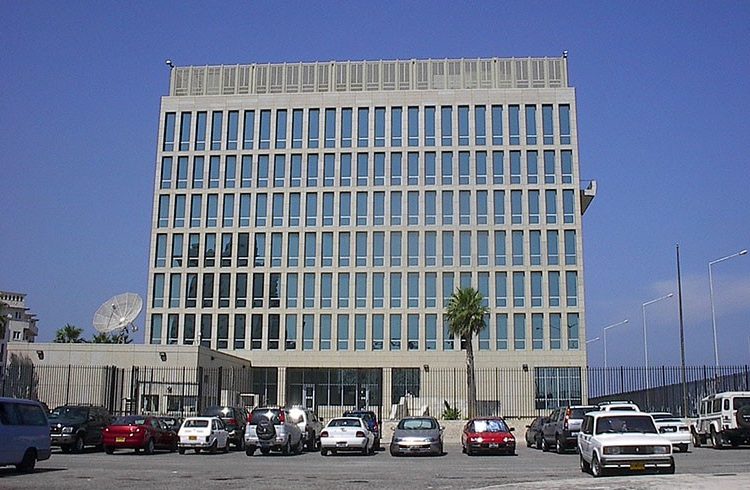The Cuban government affirmed it has never allowed the island to be used for actions against foreign diplomats and said it was willing to cooperate to clarify some “incidents” that affected the health of officials of the U.S. embassy in Havana.
The Cuban Ministry of Foreign Affairs (MINREX) thus replied, in a communique, to the U.S. Department of State’s announcement demanding in May the exit of two Cuban diplomats in Washington as a consequence of these “incidents.”
The United States has not clarified in what the events consist of, but according to CNN, which cited sources, at least two U.S. diplomats had to be taken back to their country last year to receive treatment after suffering “an acoustic attack” with “sonic devices.”
According to that media, “the employees affected were not at the same place at the same time, but suffered a variety of physical symptoms since late 2016 which resembled concussions.” As a result, some of them suffered permanent hearing loss.
CNN reports that the Department of State raised the incidents with the Cuban government and sent medical personnel to Havana, but have not been able to determine exactly what happened.
“It can be quite serious,” one official told CNN. “We have worked with the Cubans to try and find out what is going on. They insist they don’t know, but it has been very worrying and troublesome.”
The Cuban Foreign Ministry, in the text published on the night of last Wednesday, “emphatically emphasizes that Cuba has never allowed or will allow Cuban territory to be used for any action against accredited diplomatic officials or their families, without exception.”
In addition, it “reiterates the disposition to cooperate to clarify this situation.”
According to the communique, last February 17 the U.S. Embassy in Havana and the Department of State informed the Ministry of Foreign Affairs of the occurrence of some “alleged incidents affecting some officials of that diplomatic mission and their families.”
“Cuba took this issue with the utmost seriousness and acted expeditiously and professionally in order to clarify the facts of this situation, initiating a comprehensive, priority and urgent investigation on the indications of the highest level of the Cuban government,” the text continued.
Havana “conveyed to the United States Embassy the need for information-sharing and proposed to establish cooperation between the competent authorities of both countries.”
Among other measures, the Cuban authorities also “expanded and reinforced the protection and security measures of the mission, its staff and diplomatic residences,” the Foreign Ministry affirms.
In Cuba, the majority of the diplomatic personnel and their families live in housing that belongs to the Cuban state and there’s a very restrictive regulation for foreigners temporarily residing on the island to privately rent homes to Cuban individuals.
On May 23, the U.S. government conveyed to the Cuban authorities that two of its officials in Washington had to leave the country, an “unjustified and unsubstantiated decision” that motivated a formal protest.
MINREX reaffirmed that the island “complies rigorously and seriously” with all its obligations arising from the 1961 Vienna Convention on Diplomatic Relations in connection with the protection and inviolability of diplomatic agents and the premises of diplomatic missions, and defended that Cuba is considered “a safe destination for both visitors and foreign diplomats, including Americans.”
THE CONTROVERSY BEGINS
These events became news after Department of State spokeswoman Heather Nauert gave the press a cryptic explanation about the “incidents” suffered by U.S. diplomats in Havana and that in turn led to Washington asking Cuba for the exit of two of its officials in that country.
The spokeswoman gave the information in her daily press briefing after being asked about the “incidents.” Nauert specified that the U.S. government has been investigating for months what occurred, although she did not explain in what the “variety of physical symptoms” suffered by the diplomats consist of, following the policy of the Department of State to not give details when the situation involves the health of U.S. citizens.
Neither did she specify how many U.S. officials left the Havana embassy as a consequence of the event nor if they had been replaced. She only confirmed that the life of the affected was not at risk.
Nauert did not say which government agency is heading the investigation of what occurred, but an official FBI source confirmed to CBS that the Bureau is participating in the investigations.
The spokeswoman underlined several times that the Donald Trump administration “takes very seriously” these “incidents” because the Cuban executive “has the responsibility of protecting” the U.S. diplomatic personnel “according to the Geneva Convention.”
Asked why the expulsion of the Cuban officials took place in May of this year while the “incidents” took place in 2016, the spokeswoman limited herself to saying that it takes time to determine what occurred because it requires “medical tests.”
Cuba-U.S. relations are at a moment of uncertainty after President Trump announced in June a rollback in the rapprochement between the two countries promoted during the Obama administration.
The change of policy announced by Trump in Miami is still not in force, but its application should affect Americans’ travel to Cuba and business possibilities for U.S. companies on the island. However, the embassy in Havana will remain open.
The Cuban government regretted the “hostile rhetoric that recalls the times of open confrontation with our country,” but insisted on its will to “continue the respectful dialogue and the cooperation on issues of mutual interest,” as well as “the negotiation of pending bilateral affairs.”
EFE / OnCuba










